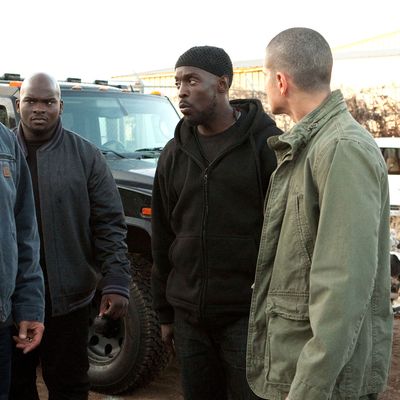
Among our movieland alpha males, Dwayne “The Rock” Johnson occupies a weird in-between space, mixing and matching various extremes of action heroes past. He’s got the cartoonish body of a Stallone or a Schwarzenegger, but he has an earnest, straight-man quality too. He can certainly take a joke, and has made his share of comedies, but he mostly avoids the irony of a Robert Downey Jr., or Bruce Willis in his prime; he defies the sardonic times we live in. But on top of all that, the guy can also act, when given decent material. And in his new crime flick Snitch, he gets just that. Despite his outlandish physique and the fact that he looks like he could break everybody else onscreen in half with minimum effort, we buy his tense desperation as an ordinary man out of his element in the dark underworld of the drug trade.
Apparently based on true events, Snitch starts off as a social-issue drama and turns into a crime thriller. Johnson plays John Matthews, a divorced father and owner of a trucking company, whose teenaged son is set up and then busted by the Feds for possession of a rather alarming amount of ecstasy. Turns out that under the mandatory minimum sentencing laws, the kid is facing at least ten years in prison — unless he turns someone else in. Trouble is, he doesn’t know anybody, because the drugs were sent to him by a turncoat friend looking to reduce his own sentence. (The film goes out of its way to make it clear that our drug laws are ridiculously unfair in this way.) Dad therefore takes matters into his own hands and offers to bust some drug dealers — under the guise of offering his trucking services as a means to ship product. If he can bring the culprits in, the Feds agree to reduce the son’s sentence. So, Matthews Wikipedias the words drug cartel, kisses his young daughter good-bye, and heads out into the night to infiltrate one of the world’s most notorious criminal enterprises. (I’m surprised we didn’t get an insert of him packing some Power Bars.)
This seems like a totally crazy idea, even for an action flick — even though it’s ostensibly based on true events — so it’s to everybody’s (but mostly the actors’) credit that we don’t spend the entire movie going, “But … butbut … butbutbut … ” Now in cahoots with the same Feds who set up his son, Matthews easily inserts himself into the North American drug trade. Using an ex-con employee (the excellent Jon Bernthal) who’s been trying to stay on the straight and narrow, he gets an introduction to local drug lord Malik (Michael K. Williams, a.k.a. Omar from The Wire, a.k.a. Chalky White from Boardwalk Empire, who’s probably praying for someone to send a romantic comedy script his way one of these days). Before he knows it, our hero is making a pickup from Malik’s Mexican suppliers — and even finding himself in the middle of a random gun battle between rival cartels at one absurdly convenient moment.
There’s a lot of cartoonish potential in Snitch, but director Ric Roman Waugh (who previously made the excellent prison drama Felon, another exercise in somber desperation) seems intent on trying to sell the movie as a more serious enterprise. And amazingly, the gambit works. The film preys on all your parental and/or protective instincts, but it does so with a kind of precision that rarely feels manipulative. When Matthews first sees his son in orange prison scrubs, the camera tilts down to a name tag that says “Inmate,” and your heart goes out for this family and their surreal predicament. Waugh keeps his camera close to his actors, for the most part, allowing the intensity of the performances to carry us along. He does occasionally give us some ethereal cityscapes, as if he’s maybe aiming for the understated grandeur of a Michael Mann movie — but all that does is make us wonder what Michael Mann might have done with a movie like this.
In the end, this is a movie that lives or dies on Johnson’s performance, and luckily, the actor is perfect: He’s grave, to be sure, at times seemingly etched in stone. (I don’t think he cracks a single smile over the course of the movie.) But he lets us see just enough of the broken man inside, to give us a sense of his inner life. “Don’t cry, not in here,” he says, voice cracking, to his imprisoned son, all the while eyeing the other inmates leering at the boy like hungry sharks. He’s a softy delivering tough love: an idealized Everydad for our age. Come to think of it, maybe he should run for governor.


